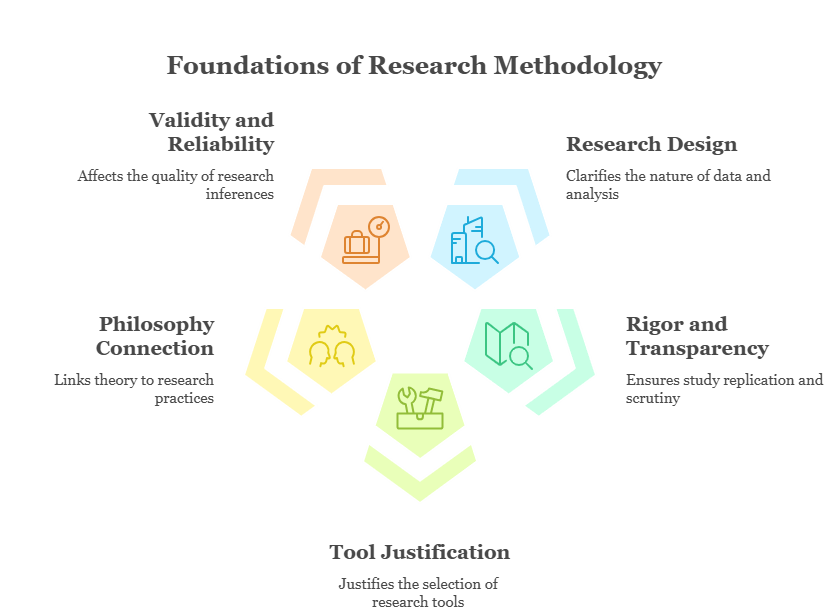Introduction
Research methodology forms the backbone of any scholarly investigation. In the context of thesis writing, it is not merely a procedural component but a critical foundation that shapes the direction, depth, and credibility of the entire study. A well-defined methodology ensures that the research is systematic, replicable, and grounded in academic rigor. As Dr. W. Lawrence Neuman emphasizes in Social Research Methods,
“Methodology is more than methods; it is the rationale and the philosophical assumptions that underlie a particular study” (Neuman, 2014).(Source)
This article explores the importance of research methodology in thesis writing, its key components, and practical guidance for scholars aiming to craft a methodologically sound thesis.
Why Research Methodology Matters in a Thesis
A thesis is expected to contribute original insights to a field of study. The research methodology justifies how the data was collected and analyzed, ensuring the results are valid and reliable. The choice of methodology must align with the research questions, objectives, and epistemological stance of the scholar.
According to Kothari (2004), in Research Methodology: Methods and Techniques,
“Without a sound methodology, the research findings will lack credibility, reliability, and scientific value.” (Source)
Key Functions of Research Methodology in Thesis Writing
- Clarifies Research Design – Methodology explains whether the study is qualitative, quantitative, or mixed-method, helping readers understand the nature of data and analysis.
- Ensures Rigor and Transparency – Detailed methodological exposition allows replication of the study and scrutiny of its processes.
- Justifies Tools and Techniques – It helps justify the selection of sampling methods, instruments (e.g., surveys, interviews), and analytical tools.
- Connects Philosophy to Practice – It links theoretical paradigms (positivism, interpretivism, critical theory) to specific research practices.
- Establishes Validity and Reliability – Methodological integrity directly affects the quality of inferences drawn from the research.

Major Research Methodology Methods
Research methodology methods are broadly classified into qualitative, quantitative, and mixed-methods approaches. Each serves a distinct purpose and is chosen based on the research objectives and nature of the study.
1. Qualitative Methods
Qualitative research seeks to understand human behavior, experiences, and social phenomena through deep exploration.
- Case Study: Provides in-depth understanding of a single case or a small number of cases.
- Ethnography: Studies cultures and communities through immersive observation.
- Phenomenology: Explores lived experiences and the meaning people assign to them.
- Grounded Theory: Aims to develop new theories grounded in field data.
- Narrative Research: Uses life stories and personal accounts as primary data.
“Qualitative research is an inquiry process of understanding based on distinct methodological traditions of inquiry that explore a social or human problem.”
– Creswell (2013)
2. Quantitative Methods
Quantitative research focuses on measurable variables and uses statistical techniques for analysis.
- Descriptive Research: Describes characteristics of a population or phenomenon.
- Experimental Research: Involves manipulation of variables to establish cause-effect relationships.
- Correlational Research: Examines relationships between two or more variables without manipulation.
- Survey Research: Gathers data from large samples using structured instruments like questionnaires.
- Quasi-Experimental Design: Similar to experimental design but lacks random assignment.
“Quantitative researchers seek explanations and predictions that will generalize to other persons and places.”
– Neuman (2014)
3. Mixed-Methods Approach
This combines qualitative and quantitative techniques in a single study to offer comprehensive insights.
- Explanatory Sequential Design: Quantitative data collection followed by qualitative exploration.
- Exploratory Sequential Design: Qualitative exploration followed by quantitative testing.
- Concurrent Triangulation Design: Both types of data are collected simultaneously to validate results.
“Mixed methods research resides in the middle of a continuum between qualitative and quantitative research.”
– Johnson & Onwuegbuzie (2004)
Components of a Good Research Methodology Chapter
A solid methodology chapter typically includes:
- Research Design: Case study, experimental, ethnography, etc.
- Population and Sampling: Description of the target population and selection techniques.
- Data Collection Methods: Surveys, interviews, observation, document review, etc.
- Data Analysis Techniques: Thematic analysis, statistical tools, coding, etc.
- Ethical Considerations: Consent, confidentiality, transparency, and researcher bias.
- Limitations of the Study: Acknowledging constraints enhances trustworthiness.
‘Scholar Foundry’ Tips for Crafting a Robust Methodology Section
- Align with Research Questions – Creswell (2013) advises: “The research design should logically flow from the research problem and questions.”
- Be Transparent and Precise – Provide details so that others can replicate your study.
- Justify Every Choice – Back each method and tool with rationale and citations.
- Anticipate and Acknowledge Limitations – Discuss potential flaws and how you plan to mitigate them
Common Mistakes to Avoid
- Using incompatible methods for your research problem.
- Vague explanation of data analysis techniques.
- Overlooking ethical considerations.
- Failing to link methodology to research objectives.
Conclusion
The research methodology is not a peripheral or mechanical part of thesis writing—it is its core. It determines the reliability of results and reflects the scholarly discipline of the researcher. As John W. Creswell rightly states,
“Good research is not only methodologically sound but is also rooted in clear, well-justified methodological decisions.”
A strong methodology chapter is, therefore, essential for producing impactful, publishable, and academically valuable research.
Let Scholar Foundry Be Your Research Partner
From topic selection to final submission, Scholar Foundry offers personalized guidance for your thesis and dissertation journey. If you’re unsure where to begin—or stuck between a few ideas—our academic mentors are here to guide you every step of the way.
Take the First Step Toward a Successful Research Journey
Contact us Today to Schedule Your Free Consultation

Pingback: 8 Research Writing Mistakes & How to Avoid Them